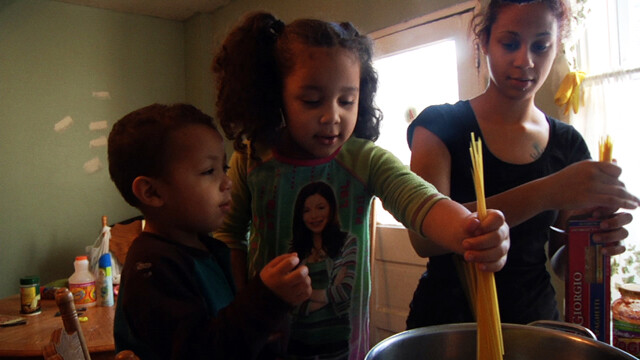Helping with Hunger
documentary aimed at highlighting food insecurity

At any given time, there are thousands of hungry people in the Chippewa Valley – and they’re not people who forgot to pack a lunch. An estimated 1 in 8 Eau Claire County residents experience food hardship, and 1 in 5 children in the county face food insecurity. While “food hardship” and “food insecurity” have slightly different academic definitions, they boil down to the same thing: There are families among us who sometimes don’t have access to enough nutritionally adequate foods to fill their bellies. The result is kids going to school hungry or adults skipping meals so their children or spouses can have something to eat.
Those who work to fight hunger know that abstract statistics only go so far in highlighting the problem and motivating others to change it. Inspiring such action takes real human stories as well, and that’s why a coalition of anti-hunger groups is hosting a free screening of the documentary A Place at the Table on Sept. 23 at UW-Eau Claire. The film, which premiered at the 2012 Sundance Film Festival and was officially released earlier this year, highlights the plight of 50 million hungry Americans by following a struggling Philadelphia single mother; a Colorado fifth-grader whose school life is disrupted by hunger; and a Mississippi second-grader whose health problems are made worse by poor nutrition. The movie also features celebrities such as actor Jeff Bridges, who’s made fighting childhood hunger a personal crusade, and Tom Colicchio, head judge on the TV series Top Chef.
Mary Canales, a UW-Eau Claire professor of nursing, said the screening is the outgrowth of an ad-hoc effort to tackle hunger in the Chippewa Valley. Along with Nancy Coffey of UW Extension, Emily Moore of Feed My People Food Bank, and others, Canales has conducted research about the problem. “It’s really heart-wrenching, when you listen to the stories,” Canales said, referring to local testimonials gathered via focus groups. Personal stories – whether from the Chippewa Valley or elsewhere in the nation – help dispel myths about the hungry in America. “These are people who work,” she said. “Some might have two jobs. Some have medical conditions or disabilities that makes it hard for them to earn a living wage.”
The documentary screening will be preceded by food and time to chat with local experts and followed by dessert and a post-screening panel discussion that will include students who’ve struggled with food insecurity. Audience members will be asked to write their responses to the film on paper plates to help spur discussion. They’ll also be asked to share their contact information if they’re willing to take the next step in fighting food insecurity.
What might that step include? Canales and her collaborators are in the process of seeking a grant to create a broader coalition to align local efforts aimed at increasing struggling residents’ access to healthy food. Attending the documentary screening could be the first step if you have a desire to feed a very real need.
A Place at the Table will be shown at 6:30pm Monday, Sept. 23, in the Woodland Theater (Room 328) of UW-Eau Claire’s Davies Center. The screening will be preceded by food and mingling with local experts at 5:30pm. The 84-minute film will be followed by a panel discussion and dessert.




















